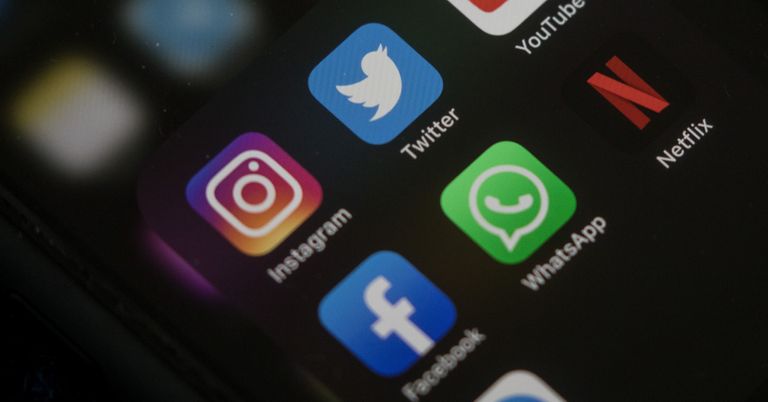How Social Media Benefit Students in 2023
How Social Media Benefit students in 2023

Introduction
The incorporation of internet technology in education has created numerous study opportunities for people all over the world.
Students are currently exchanging ideas, resources, and information via social media outside of textbooks and classroom lectures.
Platforms such as Facebook, LinkedIn, Instagram, Twitter, and others have provided students with free online communication and information.
also read: Full-ride Scholarship 2023
In this article, we will discuss how the use of social media can help to improve learning and teaching. We’ll also go over the various types of social media and how to use them effectively, but first, read through the content below to learn what social media is.
- What Exactly Is Social Media?
Social media are computer-based applications that allow people to share ideas, thoughts, and information by forming virtual networks and communities.
They are websites that enable users to share content quickly, efficiently, and in real time. Social media is divided into categories based on their functions.
- Social Media Types
Before you begin, keep in mind that not all social media platforms are created equal. They are classified based on hyper-specific user interests and technological characteristics.
While social networks such as Facebook and Twitter allow you to connect with others, discussion forums such as Reddit and Quora provide a forum for you to share news and ideas.
Keeping this in mind, you can decide where to invest your time. Check out the various social media categories listed below.
Social networks, also known as “relationship networks,” enable people and organisations to connect online in order to share information and ideas.
As a student, you can use these sites to share information, photos, videos, and other media. These platforms are primarily intended for knowledge sharing and social interaction. Here are some examples:
- Networks for Sharing Media
Connect with media sharing networks if you’re looking for the most visually appealing social media platforms. You can use these sites to create various types of social media campaigns.
In general, media sharing networks are used to share photos, videos, and live videos.
Teachers can use these media sharing networks to share lecture videos and hold live classes with their students. Business owners can also engage their audience by sharing visual content.
Here are some examples of media sharing networks:
Instagram
Snapchat
Tiktok
- Discussion forums
Discussion Networks are another type of social media platform that is recommended for students. These social platforms are where news, information, and opinions can be found, discussed, and shared.
People go to these sites to find out what everyone is talking about. They read through content threads to see who else has posted and commented. These sites’ users are generally expressive.
The available discussion networks are listed below.
reddit
Digg
Nairaland
Quora
- Interest-based networks
This is an excellent social media platform for connecting with others who share a common interest or hobby.
Interest-based networks are solely dedicated to a single topic, such as books, music, or home design. There are some good websites for keeping up with current trends.
Three social media platforms for interest-based networks are listed below:
Houzz
Goodreads
Last.fm
- Networks of Social Blogging
Social blogging networks are distinct types of social media that necessitate the creation of new content on a regular basis in order to be published.
They give people the tools they need to publish content online in formats that promote discovery, sharing, and commenting.
Among the social blogging platforms are:
WordPress
Tumblr
Students are benefiting from the social media platforms mentioned above, which provide numerous opportunities for enhancing learning and interactivity.
16 Ways Social Media Benefit students
Social Media Advantages for Students
While many people believe that social media is a major distraction for students, there are several compelling reasons why the use of social media in education should be encouraged.
Alos read: Free Educations at Canadian Universities
- Educational Resource
Disseminate information
Marketing on social media
Recent News
Global Exposition
Improved learning management systems for finding friends with similar interests
Building Supportive Online Communities: Research Work
Opportunities for Distance Learning
The Internet of Things Use to Raise Awareness
Increase Student Social Interaction
Internships and job searches benefit from the use of social media.
Consultation with mentors and experts
Developing digital portfolios
Web Engagements Participating in Group Work
- Educational Resource
Social media can be an effective learning tool in colleges and universities. Students have access to modern technology with internet connectivity, such as laptops, iPads, and smartphones, which enable them to explore various social media platforms.
Educators can also use this knowledge to improve the college education process by hosting Webinars, online discussion forums, and other similar platforms.
- Disseminate information
Students exchange ideas, opinions, tips, projects, study materials, and other useful information. They share useful information for classes and exams.
Social media improves students’ communication skills; they learn to access, evaluate, maintain, and share information.
- Marketing via social media
Students can use social media marketing as a side hustle. It is regarded as an emerging career option that prepares them to become successful marketers.
Students are extensively implementing social media strategies for a variety of companies all over the world.
- Latest News
Social media sites such as Facebook, Twitter, and Instagram keep students up to date on the lives of their friends and family, as well as various trending news from around the world.
Simply browsing the news feed provides a snapshot of job openings, new technological developments, entertainment, and global news updates.
- International Exposure
Students can share and learn about a lot of content on informative websites, tutorial videos, and webinar links by using social media.
The internet allows you to easily access vast amounts of information on any topic you can think of. As a student, you can also share your findings with your classmates.
Social media allows you to interact with teachers and students from all over the world, share knowledge, seek assistance, hold discussions, and watch classroom videos of world-renowned professors.
- Make Friends Who Share Your Interests
Social media gives you a platform to look for more opportunities, followers, and even people who share your interests and hobbies.
- Improving Learning Management Systems
Learning management systems (LMS) are networking software applications that are used to administer, document, track, report, and deliver educational courses, training programmes, or learning and development programmes.
In general, social media learning in an LMS includes instant chat functions, video, forums for information sharing, and other lesson resources to assist students.
Most LMSs include built-in social media, allowing users to interact with the system. The system encourages student participation and makes it simple to collaborate on team projects.
It aids in the research process.
Social media provides students with an excellent platform for data extraction. You can learn about people’s perspectives on a particular topic or how experts perceive and advise on specific issues.
If you are a student working on a project or assignment, social media can help you gather information and create useful research content.
Building Beneficial Online Communities
An online or internet community can help any organisation foster a sense of belonging and pride. It allows members to stay up to date on news and events that would otherwise be difficult to share with everyone.
Sports updates, individual student achievement, or a new recycling project being undertaken by members of staff are all available at the touch of a button via online communities.
It also allows alumni, prospective students, and staff to stay up to date and get a sense of the school’s personality. You can reconnect with colleagues who have already graduated in order to collaborate in the future.
- Opportunities for Distance Learning
Many disadvantaged students cannot afford a traditional college education, but social media tools enable them to obtain a formal education through distance learning programmes.
Today, hosting live lectures via Skype or webinars via Zoom is the way to go for students in remote parts of the world to gain access to education.
- Using Social Media to Raise Awareness
Social media is the most effective and cost-effective way to communicate with others. You can easily contact and deliver messages to people by using social media.
Students use social media to raise awareness and share it with their peers.
For example, you can tag or mention a friend in a post or comment on awareness, and the person will be notified immediately.
- Increase Student Social Interaction
Social media is the most popular communication channel in today’s world. It has a significant impact on how we live and how we interact with other people.
It makes it simple to connect with others. You can contact an old school friend with whom we lost contact for a long time by using social media.
Social media has greatly increased human interaction, and we can easily find it by opening social media and searching for the desired person or business.
Scholarships in the Social Sciences
- Internships and job searches benefit from social media.
Do you know how to get a job offer via social media? The majority of successful businesses use social media to find candidates.
Platforms such as LinkedIn allow job seekers to connect with potential employers. You can create a LinkedIn profile, and companies can contact and offer you based on your profile.
Aside from job searching, many people use social media to connect with mentors.
Students can gain social credibility.
As a student, social media can assist you in developing a digital portfolio for your future career. This helps to prepare and position your career for social credibility.
As social network interactions in education systems advance, social media will become the primary means of solving educational problems.
Students are encouraged to pursue a certificate in digital marketing. This can lead to a variety of social media and marketing job opportunities.
- Involvement of Parents
Every parent wishes to be involved in their children’s education. They want to be kept up to date on school-related activities, projects, and events.
Parents also like to contact teachers if they want to share their child’s progress via Skype or other secure online platforms used by the institution.
A social network for parents can be created using WhatsApp, Twitter, or Facebook Messenger, allowing them to stay up to date on school issues, learning, and education.
Parents’ involvement and academic support at home raise students’ awareness of their studies, which improves their academic performance.
- What Are the Negative Effects of Social Media on Young People in Society?
The dangers and negative effects of social media on the lives of students and youths are as follows.
Addiction: Most students are so addicted to social media that they are constantly online, reading newsfeeds and commenting on posts.
Distraction: Students are distracted from their studies and educational goals by social media.
Decreases Face-to-Face Communication Skills: Students who use social media frequently may lose their ability to communicate face to face. Even as the world becomes more technological, students must be able to communicate in the real world.
Cyberbullying: Students may write hurtful messages about other students, scarring them for life.
Students may use social media to post inappropriate content such as pornography. This completely defeats the purpose of the medium.
Knowing the dangers and risks of technology tools, students are encouraged to seize the opportunities presented by the digital world and use these tools to do good in the world.
- How to Use Social Media as a Learning Tool
If you follow the tips below, you can avoid using social media incorrectly.
Create a Facebook group for your class and make sure to post reminders to your students about important assignment instructions and submission deadlines.
Search for new online resources that make learning enjoyable and share the links with the group.
Share on the blog site book reviews, history research papers, and other assignments that students typically submit in print.
Create a daily hashtag on Twitter related to a specific topic you discussed in class.
For the flipped classroom concept, use YouTube.How Social Media Benefit students
How Social Media Benefit students
FAQs on how Social media benefits students
- How can social media benefit students?
Every student’s life revolves around social media. Accessing information, providing information, and communicating via social media is frequently easier and more convenient. Tutors and students can communicate with one another and benefit from these platforms for learning and teaching.
- What are the advantages of utilising social media?
What are the benefits of using social media?
You have a large audience.
You have a direct line of communication with your audience.
You can generate organic content.
You can use paid advertising services….
You create your own brand.
You direct traffic to your website.
You can assess your performance.
- What are the top ten advantages of social media?
Top 10 Social Media Advantages in the Digital Age
Expanding Brand Activity
Increase your online traffic.
Keeping Alive.
Increased Conversion Rates.
Boosting Brand Loyalty.
Collaboration with Influencers.
Examining the Competition
Advertising with Care.
- Refrences
www.kiiky.com www.my.cumbria.ac.uk www.webfx.com www.upgrad.com www.emertxe.com www.elearningindustry.com www.bscholarly.com www.curvearro.com www.hitechwhizz.com www.opencolleges.edu.au


